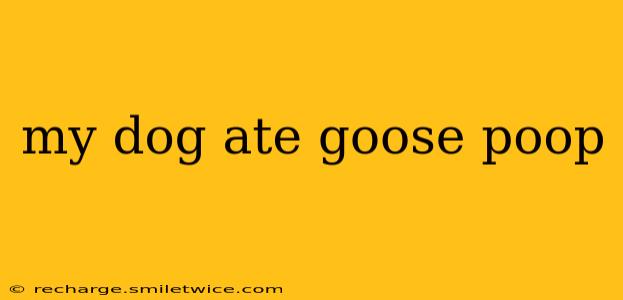My Dog Ate Goose Poop: What to Do Now?
Finding out your dog has ingested goose droppings is unsettling, to say the least. While it's not the most pleasant scenario, let's address the potential risks and what actions you should take. This guide will help you navigate this situation calmly and effectively.
What's in Goose Poop? Why Should I Worry?
Goose droppings, like the feces of other birds, contain a variety of bacteria, parasites, and pathogens. These can include E. coli, Salmonella, Giardia, and various worms. While a small amount of accidental ingestion might not cause significant problems for a healthy adult dog with a strong immune system, larger quantities or repeated exposure could lead to illness. The risk is higher for puppies, senior dogs, or dogs with weakened immune systems.
What are the symptoms of my dog eating goose poop?
This is a common question following such an incident. Symptoms can vary in severity and may not always manifest. However, watch out for:
- Diarrhea: This is a frequent symptom, often accompanied by mucus or blood.
- Vomiting: Your dog might vomit up undigested food or bile.
- Lethargy: A decrease in energy levels and overall inactivity.
- Abdominal pain: Your dog might show signs of discomfort, such as whimpering or guarding its abdomen.
- Dehydration: Look for signs of dry gums, sunken eyes, or decreased skin elasticity.
- Fever: Take your dog's temperature to check for elevated body temperature.
Should I take my dog to the vet if they ate goose poop?
This depends on several factors. If your dog is exhibiting any of the symptoms mentioned above, especially severe diarrhea, vomiting, or lethargy, seek veterinary attention immediately. Even if your dog seems fine, it's advisable to monitor them closely for 24-48 hours. Contact your vet if you have any concerns. They can assess your dog's overall health and advise on the best course of action. Consider the amount of goose poop ingested; a small amount might be less concerning than a large quantity.
How can I prevent my dog from eating goose poop in the future?
Prevention is key! Here are some helpful tips:
- Supervise your dog: Keep a close eye on your dog, especially in areas frequented by geese.
- Train your dog: Teach your dog a reliable "leave it" command to discourage them from picking up things off the ground.
- Clean up after geese: If you frequent areas with geese, try to clean up their droppings promptly.
- Use a leash: Keeping your dog on a leash in public spaces will give you more control over their behavior.
What if my dog ate a large amount of goose poop?
Ingestion of a substantial amount of goose droppings warrants immediate veterinary attention. The risks of infection and illness increase significantly with larger quantities. Your vet might recommend inducing vomiting or providing supportive care, depending on the situation.
Disclaimer: This information is for general knowledge and does not constitute veterinary advice. Always consult with a qualified veterinarian for any health concerns regarding your pet.
